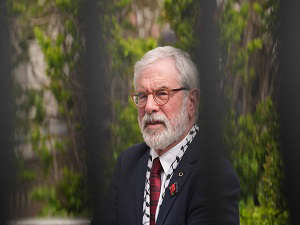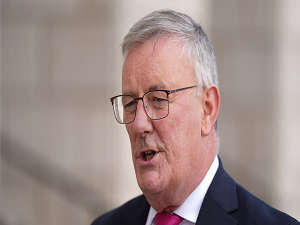
By Staff Reporter
Northern Ireland's political leaders have missed a deadline to restore powersharing at Stormont.
Despite busting through yet another statutory cut-off point, the fourth since the institutions collapsed earlier this year, negotiations look set to continue over the coming days to get a deal over the line.
It is understood Northern Ireland Secretary James Brokenshire has told the five main Stormont parties he will reflect on the situation over the weekend, allowing further talks in the interim, before making a statement at Westminster on Monday outlining his intentions.
Options open to him include setting a fifth deadline for the talks process, calling another snap Assembly election or reimposing some form of direct rule from London.
The Democratic Unionists and Sinn Fein, the two parties whose agreement is required to form a new administration, have accused each other of refusing to give ground on key issues.
A key sticking point in the way of a deal appears to be Sinn Fein's demand for an Irish Language Act, which would bestow official protections for Gaelic speakers.
The DUP is willing to legislate on the language issue, but only if Ulster Scots speakers are included in any Act, a condition Sinn Fein has rejected.
The 4pm deadline to nominate ministers to a coalition executive passed by the wayside with both parties still blaming each other for the impasse.
Senior DUP negotiator Edwin Poots said if a deal did not materialise in the near future he would prefer direct rule ministers to take over running Stormont departments.
"The talks are continuing, obviously there is not going to be a breakthrough that would lead to nominations taking place today," he said.
"The talks will continue, Sinn Fein know what they need to do."
He added: "At this stage we aren't close to an agreement, there is considerable work to be done and we believe the ball is in the court of Sinn Fein in the main in dealing with a series of outstanding issues."
However, Sinn Fein insisted the DUP had to move, claiming it was "make up your mind time" for the unionists.
Sinn Fein's Conor Murphy said "limited progress" had been made to bridge the gaps.
"In our view it's now make up your mind time for the DUP," he said.
"We have always said this can be done in a matter of hours, the issues are very clear, there are still gaps in terms of trying to establish a rights-based approach to these institutions working, as per the Good Friday Agreement.
"We want to close those gaps. There has been some limited progress in closing those gaps. We want to get this done, we want to get it done quickly and on a sustainable basis."
Earlier, Mr Brokenshire and Dublin's Foreign Affairs Minister Simon Coveney insisted a deal was "possible and achievable".
Delivering a joint statement at the talks venue at Stormont Castle, they gave no firm indication on the way ahead once the deadline passed.
Mr Brokenshire said a number of issues remain outstanding.
"I believe a resolution can be found," he said.
"And I'm urging the parties to continue focusing all of their efforts on achieving this.
"The UK Government will work with the parties toward their critical objective of forming an executive.
"But I've made clear to party leaders that it is for them to reach agreement."
Mr Brokenshire added: "That prize remains achievable and remains my focus."
Mr Coveney said the last three days of talks had been intensive and he was encouraged by the discussions.
"There still remain gaps to be bridged on some key issues," he said.
"Like the Secretary of State I believe that an agreement is still within reach, an agreement that would allow a powersharing executive to be formed on a sustainable basis."
Mr Coveney said all parties were committed to the successful operations of all the political institutions in Belfast and everyone was convinced devolution was the best way to deliver for the people of Northern Ireland.
"With courage and goodwill this can be achieved and everybody here is continuing to focus on a positive outcome," he said.
The institutions imploded in January when DUP leader Arlene Foster was forced from office after Sinn Fein's then deputy first minister, the late Martin McGuinness, quit in protest at the DUP's handling of the renewable heat incentive (RHI), a scheme that left the administration facing a £490 million overspend.
His move triggered a snap Assembly election in March.
Prime Minister Theresa May's official spokesman said: "If, despite our collective efforts, it proves impossible to re-establish the executive, we will need to consider the options to ensure Northern Ireland has the political stability that it needs.
"In terms of what those options are, I wouldn't get into that at this stage."


 Gerry Adams awarded 100,000 euro in damages after suing BBC for libel
Gerry Adams awarded 100,000 euro in damages after suing BBC for libel
 Victim held in room while masked men ransack Saintfield home
Victim held in room while masked men ransack Saintfield home
 Nesbitt not surprised if ‘devastating’ culture in RVH report repeated elsewhere
Nesbitt not surprised if ‘devastating’ culture in RVH report repeated elsewhere
 Pensioner, 82, killed in crash near Omagh
Pensioner, 82, killed in crash near Omagh
 Kneecap announce new song ahead of headline performance at London’s Wide Awake
Kneecap announce new song ahead of headline performance at London’s Wide Awake